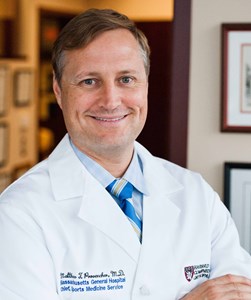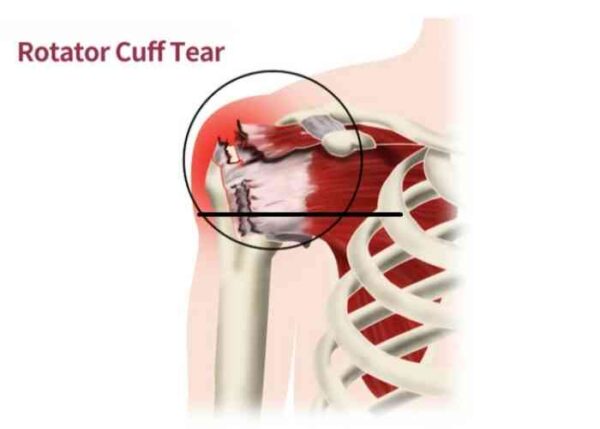Rotator Cuff Injury Specialist

Are you an athlete who participates in sports that involve throwing overhead? If so, you may be at risk of sustaining a rotator cuff tear. A rotator cuff tear is typically caused by a fall, sports injury or degeneration. Rotator cuff injury specialist, Dr. Matthew Provenccher provides diagnosis and both surgical and nonsurgical treatment options for patients in Vail who have sustained a rotator cuff injury. Contact Dr. Provencher’s team today!
What is a Rotator Cuff Tear?
A rotator cuff injury is quite common in both young and older active individuals. The rotator cuff is composed of four muscle-tendon units that surround the shoulder joint and provide overhead arm motion and strength. Rotator cuff injuries, such as a rotator cuff tear, can occur during sports activities, from a fall, from degeneration of a tendon or from repetitive overhead motion of the arm. Dr. Matthew Provencher, orthopedic shoulder specialist serving patients from the Vail, Aspen, Colorado Springs and Denver, Colorado area, is highly trained and experienced in rotator cuff surgery and returning patients to a healthy, active lifestyle.
A rotator cuff injury occurs when any muscle-tendon unit that creates the structure becomes damaged. This typically occurs by the tearing, or separation, of the tendon attachment off of the humerus (upper arm bone), leading to a rotator cuff tear.
Several factors can damage the rotator cuff, including:
- Acute injury- The rotator cuff sustains damage due to a sports injury, automobile accident, fall, or other traumatic event.
- Chronic overuse- The rotator cuff sustains damage from continuous, repetitive movements, such as throwing, swimming, tennis or other sports activity.
- Degeneration- The rotator cuff sustains damage from natural wear and tear associated with aging.
Shoulder impingement and tendonitis are also associated with certain rotator cuff tears.
What are Rotator Cuff Injury Symptoms?
The hallmark symptom of a rotator cuff tear is pain over the top of the shoulder joint and arm. The pain may travel down the arm and towards the elbow joint in some patients. The shoulder pain may also interfere with rest and sleep if the patient sleeps on the affected shoulder.
Other common rotator cuff injury symptoms include shoulder weakness and tenderness caused from the inflammation that accompanies the muscle-tendon damage.
How to Know if you have a Rotator Cuff Tear?
If a patient believes they have experienced a rotator cuff tear from a traumatic event, from overuse, or from natural degeneration, Dr. Provencher will perform a thorough medical examination. During the examination, he will look for any weakness, deformities, or muscle wasting in the injured area. Dr. Provencher will carefully assess the affected shoulder’s range of motion and strength. He will also manipulate the muscles and bones to find any areas of pain and tenderness. A number of tests, such as x-rays and an MRI, may also be performed to confirm the diagnosis.

What are Rotator Cuff Treatments?
Many cases of a rotator cuff injury will heal without rotator cuff surgery. The success of non-surgical treatment is dependent on the size of tear, type of tear, and patient activity level.
Do I Need Surgery for a Rotator Cuff Tear?
Dr. Provencher’s goal with non-surgical treatment involves the reduction of inflammation, as well as strengthening the shoulder muscles that were not damaged to compensate for the torn muscle-tendon unit. Non-surgical treatment commonly includes rest, ice, heat, physical therapy, medication and cortisone injections to relieve pain and promote healing. It is strongly suggested that patients work with the in-house physical therapists at Howard Head Sports Medicine to optimize their rehabilitation.
What are the Surgical Treatment Options for a Rotator Cuff Tear?
Dr. Provencher will determine the correct rotator cuff surgery based on the patient’s age, activity level, and severity of the tear.
Many rotator cuff injuries are treated by Dr. Provencher with an arthroscopic approach. During the procedure, tiny incisions are created in the injured area so Dr. Provencher can insert a small camera, and view the damaged area in great detail. After viewing the injured muscle-tendon unit, he will insert small, special surgical instruments, and repair the damaged area. Arthroscopic rotator cuff surgery provides numerous benefits to patients, including less pain, and a quicker return to activities.
For more information on a rotator cuff injury, such as a rotator cuff tear, please contact Dr. Matthew Provencher, orthopedic shoulder specialist serving patients from the Vail, Aspen, Colorado Springs and Denver, Colorado area.